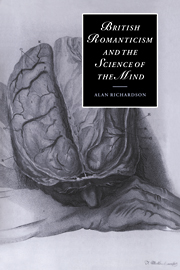Book contents
- Frontmatter
- Contents
- List of illustrations
- Preface
- List of abbreviations
- 1 Introduction: neural Romanticism
- 2 Coleridge and the new unconscious
- 3 A beating mind: Wordsworth's poetics and the “science of feelings”
- 4 Of heartache and head injury: minds, brains, and the subject of Persuasion
- 5 Keats and the glories of the brain
- 6 Embodied universalism, Romantic discourse, and the anthropological imagination
- 7 Epilogue
- Notes
- Bibliography
- Index
- CAMBRIDGE STUDIES IN ROMANTICISM
2 - Coleridge and the new unconscious
Published online by Cambridge University Press: 22 September 2009
- Frontmatter
- Contents
- List of illustrations
- Preface
- List of abbreviations
- 1 Introduction: neural Romanticism
- 2 Coleridge and the new unconscious
- 3 A beating mind: Wordsworth's poetics and the “science of feelings”
- 4 Of heartache and head injury: minds, brains, and the subject of Persuasion
- 5 Keats and the glories of the brain
- 6 Embodied universalism, Romantic discourse, and the anthropological imagination
- 7 Epilogue
- Notes
- Bibliography
- Index
- CAMBRIDGE STUDIES IN ROMANTICISM
Summary
Given Coleridge's influential defense of a unitary, transcendentalist conception of mind, it seems ironic that “Kubla Khan” is becoming a standard example within cognitivist accounts of a modular and material brain-mind. The pioneering cognitive psychologist Allan Paivio, for one, cites Coleridge's narrative of the poem's composition for its intuitive glimpse into the fundamental “duality” that empirical research would later establish between the visual and verbal systems, supporting two distinct “modes of thought.” Steven Pinker, in his popular book The Language Instinct, also cites Coleridge's description of poetic “composition in which all the images rose up before him as things, with a parallel production of the correspondent expressions,” in discussing his conception of “mentalese,” a preverbal and unconscious representational system probably closer to computing languages than to any human dialect. The Artificial Intelligence researcher Margaret Boden, for her part, takes issue with Coleridge's “romantic” account of spontaneous composition in her study of cognition and creativity, noticing the introduction to “Kubla Khan” only to dismiss it. Yet Boden also finds in Coleridge's scattered remarks and poetic practice the outlines of a computational approach to unconscious mental composition, recuperating his revisionist account of associationist theory as an inspired premonition of neural network models of creative cognition. What, one wonders, would Coleridge himself make of all this?
- Type
- Chapter
- Information
- British Romanticism and the Science of the Mind , pp. 39 - 65Publisher: Cambridge University PressPrint publication year: 2001
- 1
- Cited by



